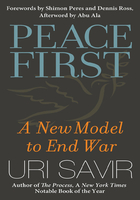
FOREWORD
by Shimon Peres
PEACE REFLECTS THE MOST FUNDAMENTAL RIGHT AND HUMAN desire—the right to life. Peace is the right of a parent to protect a child from poverty and conflict, and peace is the profound social diktat that a man must put down his gun. And although peace should therefore be considered the natural state of affairs, war seems to be the only constant in our history. Peace is the time between wars, and war is legitimately employed to pursue a society’s interests.
Technology and the free market economy have transformed the world into a global village, and the phenomenon of globalization has become the pivotal element that should create world peace. Yet the unprecedented wealth generated by the forces of globalization has been amassed by the developed world rather than substantively dispersed to the poor and developing nations so desperate to reap its fruits. While the champions and beneficiaries of globalization continue to accumulate wealth, know-how, and power; to reach unparalleled levels of education, communication, and quality of life; and to create a megaculture as a byproduct, the other half still lives differently. The developing world remains impoverished and disease-stricken, and many of these countries exist to sustain conflict.
The ever-increasing gap between the developing and developed worlds is engendering a new conflict; the impoverished now threaten world peace. The union of poverty, fundamentalist ideologies, and weapons of mass destruction is a devastating hybrid that has planted its roots in the fertile lands of frustrated and estranged constituencies.
In such conditions, creating and sustaining peace is an arduous task. And in this sense, the peace-desiring world does not face an enemy in the traditional sense. Rather, we must confront the issues of the day: poverty, extremism, terrorism, dissemination of unconventional weaponry, pollution, and cultural estrangement.
Globalization has intensified these challenges. The power of the nation-state is in steady decline as it becomes decentralized, moving from central governments to other institutions. Capital has moved from the public sector to the private sector, promoting social values has become the task of nongovernmental organizations, and even war is less an act of state than an operation of violent terrorist groups.
In this state of the world, peacemaking must be reformed. A new coalition of forces must pave the way to a citizens’ peace, involving a complex puzzle of participants and interactions to ensure the sustainability of peace.
In this book, Uri Savir has endeavored to confront these important challenges by offering a solution to the peacemaking puzzle that is courageous, innovative, and based on his extensive experience as a peacemaker. This groundbreaking book presents readers with a fresh approach to the most important challenge of this century—making peace. It will no doubt contribute to the necessary debate on the critical question of how to make peace in our era.